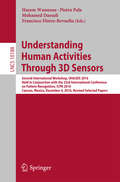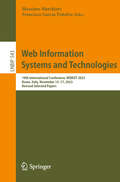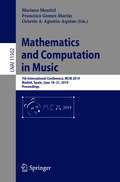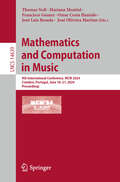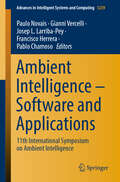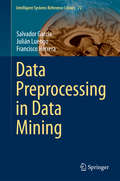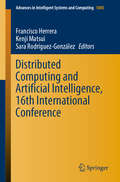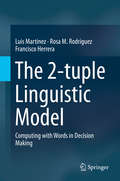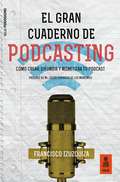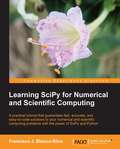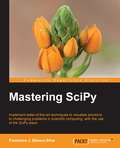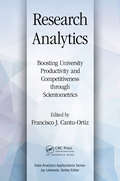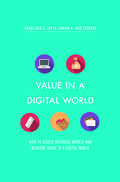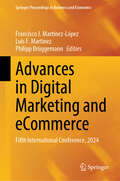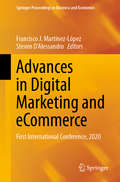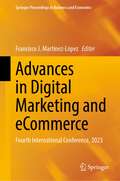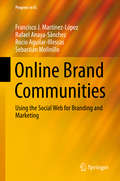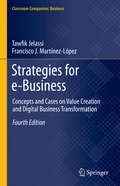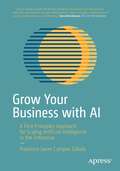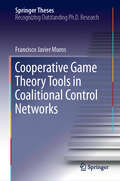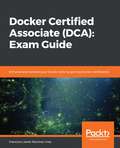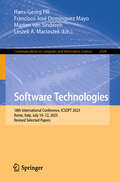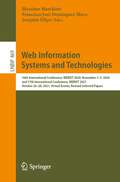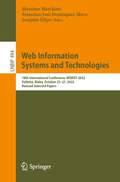- Table View
- List View
Understanding Human Activities Through 3D Sensors: Second International Workshop, Uha3ds 2016, Held In Conjunction With The 23rd International Conference On Pattern Recognition, Icpr 2016, Cancun, Mexico, December 4, 2016, Revised Selected Papers (Theoretical Computer Science and General Issues #10188)
by Mohamed Daoudi Hazem Wannous Pietro Pala Francisco Flórez-RevueltaThis book constitutes the revised selected papers of the Second International Workshop on Understanding Human Activities through 3D Sensors, UHA3DS 2016, that was held in conjunction with the 23rd International Conference on Pattern Recognition, ICPR 2016, held in Cancun, Mexico, in December 2016. The 9 revised full papers were carefully reviewed and selected from 12 submissions. The papers are organized in topical sections on Behavior Analysis, Human Motion Recognition, and Application Datasets.
Web Information Systems and Technologies: 19th International Conference, WEBIST 2023, Rome, Italy, November 15–17, 2023, Revised Selected Papers (Lecture Notes in Business Information Processing #543)
by Massimo Marchiori Francisco García PeñalvoThis book constitutes the refereed proceedings of the 19th International Conference on Web Information Systems and Technologies, WEBIST 2023, held in Rome, Italy, during November 15–17, 2023. The 5 full papers and 8 short papers included in this book were carefully reviewed and selected from 77 submissions. The selected papers contribute to the understanding of relevant trends of current research on Web Information Systems and Technologies, including: Human Computer Interaction, Application, Research Project and Internet Technology, UX and User-Centric Systems, Web Programming, Web Tools and Languages, Applications, Research Projects and Web Intelligence, Natural Language Processing, Human Factors, Web Information Filtering and Retrieval and Web Interfaces and Applications.
Mathematics and Computation in Music: 7th International Conference, MCM 2019, Madrid, Spain, June 18–21, 2019, Proceedings (Lecture Notes in Computer Science #11502)
by Octavio A. Agustín-Aquino Mariana Montiel Francisco Gomez-MartinThis book constitutes the thoroughly refereed proceedings of the 7th International Conference on Mathematics and Computation in Music, MCM 2019, held in Madrid, Spain, in June 2019. The 22 full papers and 10 short papers presented were carefully reviewed and selected from 48 submissions. The papers feature research that combines mathematics or computation with music theory, music analysis, composition, and performance. They are organized in topical sections on algebraic and other abstract mathematical approaches to understanding musical objects; remanaging Riemann: mathematical music theory as “experimental philosophy”?; octave division; computer-based approaches to composition and score structuring; models for music cognition and beat tracking; pedagogy of mathematical music theory.The chapter “Distant Neighbors and Interscalar Contiguities” is available open access under a Creative Commons Attribution 4.0 International License via link.springer.com.
Mathematics and Computation in Music: 9th International Conference, MCM 2024, Coimbra, Portugal, June 18–21, 2024, Proceedings (Lecture Notes in Computer Science #14639)
by Thomas Noll Mariana Montiel Francisco Gómez Omar Costa Hamido José Luis Besada José Oliveira MartinsThis book constitutes the refereed proceedings of the 9th International Conference on Mathematics and Computation in Music, MCM 2024, held in Coimbra, Portugal, during June 18–21, 2024. The 30 full papers and 9 short papers included in this book were carefully reviewed and selected from 45 submissions. They were organized in topical sections as follows: mathematical scale theory and tuning; rhythm analysis and rhythm generation; categorical and algebraic approaches to music; quantum music; theory and algorithms for melodic- harmonic analysis and generation; geometric approaches to musical algorithms and microtonality; fourier analysis for music; similarity and distance measures for music; short papers; communication-performances; and tribute to Yves Hellegouarch.
Ambient Intelligence – Software and Applications: 11th International Symposium on Ambient Intelligence (Advances in Intelligent Systems and Computing #1239)
by Paulo Novais Francisco Herrera Pablo Chamoso Gianni Vercelli Josep L. Larriba-PeyThis book includes the outcomes of the 11th International Symposium on Ambient Intelligence (ISAmI 2020). The 11th International Symposium on Ambient Intelligence is hosted by the University of L’Aquila and is going to be held in L’Aquila (Italy). Initially planned on the 17th to the 19th of June 2020, it was postponed to the 7th to the 9th of October 2020, due to the COVID-19 outbreak.
Data Preprocessing in Data Mining (Intelligent Systems Reference Library #72)
by Francisco Herrera Salvador García Julián LuengoData Preprocessing for Data Mining addresses one of the most important issues within the well-known Knowledge Discovery from Data process. Data directly taken from the source will likely have inconsistencies, errors or most importantly, it is not ready to be considered for a data mining process. Furthermore, the increasing amount of data in recent science, industry and business applications, calls to the requirement of more complex tools to analyze it. Thanks to data preprocessing, it is possible to convert the impossible into possible, adapting the data to fulfill the input demands of each data mining algorithm. Data preprocessing includes the data reduction techniques, which aim at reducing the complexity of the data, detecting or removing irrelevant and noisy elements from the data. This book is intended to review the tasks that fill the gap between the data acquisition from the source and the data mining process. A comprehensive look from a practical point of view, including basic concepts and surveying the techniques proposed in the specialized literature, is given. Each chapter is a stand-alone guide to a particular data preprocessing topic, from basic concepts and detailed descriptions of classical algorithms, to an incursion of an exhaustive catalog of recent developments. The in-depth technical descriptions make this book suitable for technical professionals, researchers, senior undergraduate and graduate students in data science, computer science and engineering.
Distributed Computing and Artificial Intelligence, 16th International Conference (Advances in Intelligent Systems and Computing #1003)
by Francisco Herrera Sara Rodríguez-González Kenji MatsuiThis book features the outcomes of the 16th International Conference on Distributed Computing and Artificial Intelligence 2019 (DCAI 2019), which is a forum to present applications of innovative techniques for studying and solving complex problems in artificial intelligence and computing. The exchange of ideas between scientists and technicians from both the academic and industrial sectors is essential to facilitate the development of systems that can meet the ever-increasing demands of today’s society. This book brings together lessons learned, current work and promising future trends associated with distributed computing, artificial intelligence and their application to provide efficient solutions to real-world problems.The book includes 29 high-quality and diverse contributions in established and emerging areas of research presented at the symposium organized by the Osaka Institute of Technology, Hiroshima University, University of Granada and University of Salamanca, which was held in Ávila, Spain, from 26th–28th June 2019
The 2-tuple Linguistic Model
by Francisco Herrera Luis Martínez Rosa M. RodriguezThis book examines one of the more common and wide-spread methodologies to deal with uncertainty in real-world decision making problems, the computing with words paradigm, and the fuzzy linguistic approach. The 2-tuple linguistic model is the most popular methodology for computing with words (CWW), because it improves the accuracy of the linguistic computations and keeps the interpretability of the results. The authors provide a thorough review of the specialized literature in CWW and highlight the rapid growth and applicability of the 2-tuple linguistic model. They explore the foundations and methodologies for CWW in complex frameworks and extensions. The book introduces the software FLINTSTONES that provides tools for solving linguistic decision problems based on the 2-tuple linguistic model. Professionals and researchers working in the field of classification or fuzzy sets and systems will find The 2-tuple Linguistic Model: Computing with Words in Decision Making a valuable resource. Undergraduate and postdoctoral students studying computer science and statistics will also find this book a useful study guide.
El Gran Cuaderno de Podcasting: Cómo crear, difundir y monetizar tu podcast
by Francisco IzuzquizaEl Gran Cuaderno de Podcasting muestra todo lo necesario para aprender a crear un podcast, publicarlo y darlo a conocer para convertirse en un podcaster profesional. Francisco Izuzquiza, locutor y consultor de radio y podcasts, describe las claves y las herramientas imprescindibles para iniciarnos en el mundo de los podcasts y los consejos y aspectos técnicos para usuarios más avanzados o, incluso, expertos. Desde la elección del tema del podcast, su planificación, los métodos de grabación o el micrófono más recomendable según nuestras necesidades y presupuesto, a los programas de grabación, el alojamiento del podcast, la medición de escuchas, los rankings, la música, los derechos de autor y la monetización. El auge de los podcasts supone un reto apasionante para todo aquel que quiere acercase a esta actividad desde el mundo de la radio o desde cualquier otro sector. En este libro el autor comparte su experiencia y todo lo aprendido hasta conseguir dedicarse al podcasting de forma profesional.
Learning SciPy for Numerical and Scientific Computing
by Francisco J. Blanco-SilvaA step-by-step practical tutorial with plenty of examples on research-based problems from various areas of science, that prove how simple, yet effective, it is to provide solutions based on SciPy.This book is targeted at anyone with basic knowledge of Python, a somewhat advanced command of mathematics/physics, and an interest in engineering or scientific applications---this is broadly what we refer to as scientific computing.This book will be of critical importance to programmers and scientists who have basic Python knowledge and would like to be able to do scientific and numerical computations with SciPy.
Mastering SciPy
by Francisco J. Blanco-SilvaImplement state-of-the-art techniques to visualize solutions to challenging problems in scientific computing, with the use of the SciPy stackAbout This BookMaster the theory and algorithms behind numerical recipes and how they can be applied to real-world problemsLearn to combine the most appropriate built-in functions from the SciPy stack by understanding the connection between the sources of your problem, volume of data, or computer architectureA comprehensive coverage of all the mathematical techniques needed to solve the presented topics, with a discussion of the relevant algorithms built in the SciPy stackWho This Book Is ForIf you are a mathematician, engineer, or computer scientist with a proficiency in Python and familiarity with IPython, this is the book for you. Some basic knowledge of numerical methods in scientific computing would be helpful.What You Will LearnMaster relevant algorithms used in symbolic or numerical mathematics to address approximation, interpolation, differentiation, integration, root-finding, and optimization of scalar or multi-variate functionsDevelop different algorithms and strategies to efficiently store and manipulate large matrices of data, in particular to solve systems of linear equations, or compute their eigenvalues/eigenvectorsUnderstand how to model physical problems with systems of differential equations and distinguish the factors that dictate the strategies to solve themPerform statistical analysis, hypothesis test design and resolution, or data mining at a higher level, and apply them to real-life problems in the field of data analysisGain insights on the power of distances, Delaunay triangulations and Voronoi diagrams for Computational Geometry, and apply them to various engineering problemsFamiliarize yourself with different techniques in signal/image processing, including filtering audio, images, or video to extract information, features, or remove componentsIn DetailThe SciPy stack is a collection of open source libraries of the powerful scripting language Python, together with its interactive shells. This environment offers a cutting-edge platform for numerical computation, programming, visualization and publishing, and is used by some of the world's leading mathematicians, scientists, and engineers. It works on any operating system that supports Python and is very easy to install, and completely free of charge! It can effectively transform into a data-processing and system-prototyping environment, directly rivalling MATLAB and Octave.This book goes beyond a mere description of the different built-in functions coded in the libraries from the SciPy stack. It presents you with a solid mathematical and computational background to help you identify the right tools for each problem in scientific computing and visualization. You will gain an insight into the best practices with numerical methods depending on the amount or type of data, properties of the mathematical tools employed, or computer architecture, among other factors.The book kicks off with a concise exploration of the basics of numerical linear algebra and graph theory for the treatment of problems that handle large data sets or matrices. In the subsequent chapters, you will delve into the depths of algorithms in symbolic algebra and numerical analysis to address modeling/simulation of various real-world problems with functions (through interpolation, approximation, or creation of systems of differential equations), and extract their representing features (zeros, extrema, integration or differentiation).Lastly, you will move on to advanced concepts of data analysis, image/signal processing, and computational geometry.Style and approachPacked with real-world examples, this book explores the mathematical techniques needed to solve the presented topics, and focuses on the algorithms built in the SciPy stack.
Research Analytics: Boosting University Productivity and Competitiveness through Scientometrics (Data Analytics Applications)
by Francisco J. Cantu-OrtizThe growth of machines and users of the Internet has led to the proliferation of all sorts of data concerning individuals, institutions, companies, governments, universities, and all kinds of known objects and events happening everywhere in daily life. Scientific knowledge is not an exception to the data boom. The phenomenon of data growth in science pushes forth as the number of scientific papers published doubles every 9–15 years, and the need for methods and tools to understand what is reported in scientific literature becomes evident. <P><P>As the number of academicians and innovators swells, so do the number of publications of all types, yielding outlets of documents and depots of authors and institutions that need to be found in Bibliometric databases. These databases are dug into and treated to hand over metrics of research performance by means of Scientometrics that analyze the toil of individuals, institutions, journals, countries, and even regions of the world. The objective of this book is to assist students, professors, university managers, government, industry, and stakeholders in general, understand which are the main Bibliometric databases, what are the key research indicators, and who are the main players in university rankings and the methodologies and approaches that they employ in producing ranking tables. <P><P>The book is divided into two sections. The first looks at Scientometric databases, including Scopus and Google Scholar as well as institutional repositories. The second section examines the application of Scientometrics to world-class universities and the role that Scientometrics can play in competition among them. It looks at university rankings and the methodologies used to create these rankings. Individual chapters examine specific rankings that include: <P><P> <P><P>QS World University <P><P>Scimago Institutions <P><P>Webometrics <P><P>U-Multirank <P><P>U.S. News & World Report <P><P>The book concludes with a discussion of university performance in the age of research analytics.
Value in a Digital World
by Francisco J. López Lubián José EstevesAn in-depth examination of the concept of value in a digital world, an analysis of a range of digital business models and a framework for assessing the value of digital businesses. Assessing the value of traditional business was easy. There are hard, well tested metrics and tangible, measurable assets you can literally kick the tyres of. But how do you measure the value of something that consists of little more than bits of information, brand awareness and a compelling idea? In the winner takes all digital world how do you know if this idea is one that will attract billions of dedicated users or a few thousand fleeting trialists? And, most importantly, how do you assess whether any given business model is robust enough to make billions or flawed in a way that will lose millions? Lopez Lubian and Esteves look at what economic value means in a digital world, and argue for a shift from traditional value metrics to digital value metrics. Through high profile case studies they examine the process of valuation in the digital world – examining the challenges of making objective judgments from subjective information and how to assess the value of data. Next they analyse in depth a number of different digital business models from the perspective of delivering value to investors, stakeholders and society at large. Finally they present a framework model for assessing value in digital business.
Advances in Digital Marketing and eCommerce: Fifth International Conference, 2024 (Springer Proceedings in Business and Economics)
by Francisco J. Martínez-López Luis F. Martinez Philipp BrüggemannThe Digital Marketing and eCommerce Conference brings together leading researchers and scholars to exchange and share their experiences and findings on all aspects of ecommerce and digital marketing. This volume presents the proceedings of the 2024 edition. Showcasing a range of original theoretical and methodological approaches, they address such diverse areas of application as social media; digital nudging; digital luxury; trends; crowdfunding; virtual reality (VR), augmented reality (AR) and the metaverse; generative artificial intelligence (AI); green ecommerce; environmental, social, and corporate governance (ESG); electronic word-of-mouth (eWOM); gamification; text mining; customer journey; and private label brands.
Advances in Digital Marketing and eCommerce: First International Conference, 2020 (Springer Proceedings in Business and Economics)
by Francisco J. Martínez-López Steven D’AlessandroThis book highlights the latest research presented at the first Digital Marketing & eCommerce Conference (Barcelona, Spain, June 2020). Papers include a diverse set of digital marketing and eCommerce-related topics such as user psychology and behavior in social commerce, influencer marketing in social commerce, social media monetization strategies, social commerce characteristics and their impact on user behavior, social branding, business model, user privacy, and more.
Advances in Digital Marketing and eCommerce: Fourth International Conference, 2023 (Springer Proceedings in Business and Economics)
by Francisco J. Martínez-LópezThe Digital Marketing and eCommerce Conference aims to bring together leading researchers and research scholars to exchange and share their experiences and research results on any aspects of ecommerce and digital marketing. This volume presents the proceedings of the 2023 edition in a collection of contributions with many original approaches. They address diverse areas of application such as online brand communities, channel design, online retailing, cryptocurrencies, user-generated content, TikTok, among others. A wide variety of theoretical and methodological approaches have been used.
Advances in National Brand and Private Label Marketing: Eighth International Conference, 2021 (Springer Proceedings in Business and Economics)
by Francisco J. Martínez-López Juan Carlos Gázquez-AbadThis proceedings volume highlights the latest research presented at the 8th International Conference on Research on National Brand & Private Label Marketing (NB&PL2021). The topics covered include: retailing, private label portfolio and assortment management, marketing of premium store brands, using national brands to exclude (delist) and include, optimal assortment size, consumer store patronage, etc. Several contributions also focus on private label pricing and promotion, especially on the relative pricing of standard and premium private labels, and with regard to the national brands in the assortment.
Online Brand Communities
by Francisco J. Martínez-López Rafael Anaya-Sánchez Rocio Aguilar-Illescas Sebastián MolinilloThis book presents and analyzes the concept of online brand communities, an emerging and exciting topic in marketing and eCommerce. First, it lays out the foundations like the evolution of the Web and the so-called Social Web, its utility for users and businesses, and the evolution of the marketing mind-set to adapt the Social Web. On this basis, the book then presents a detailed analysis of online brand communities, examining the concept of virtual community with a specific focus on virtual brand communities. In this context the book also explores recent trends related to branding and brand management. Next, it proposes a classification system for online brand communities, taking into account questions like the motivating factors for consumers to join, participate and stay in a community. The process of value creation in communities is examined from both business and consumer perspectives. The book draws to a close with a brief presentation of the process broadly accepted for the successful development of online brand communities.
Strategies for e-Business: Concepts and Cases on Value Creation and Digital Business Transformation (Classroom Companion: Business)
by Francisco J. Martínez-López Tawfik JelassiThis is the fourth edition of a unique textbook that provides extensive coverage of the evolution, the current state, and the practice of e-business strategies. It provides a solid introduction to understanding e-business and e-commerce by combining fundamental concepts and application models with practice-based case studies. An ideal classroom companion for business schools, the authors use their extensive knowledge to show how corporate strategy can imbibe and thrive by adopting vibrant e-business frameworks with proper tools. Students will gain a thorough knowledge of developing electronic and mobile commerce strategies and the methods to deal with these issues and challenges.
Grow Your Business with AI: A First Principles Approach for Scaling Artificial Intelligence in the Enterprise
by Francisco Javier Campos ZabalaLeverage the power of Artificial Intelligence (AI) to drive the growth and success of your organization. This book thoroughly explores the reasons why it is so hard to implement AI, and highlights the need to reconcile the motivations and goals of two very different groups of people, business-minded and technical-minded. Divided into four main parts (First Principles, The Why, The What, The How), you'll review case studies and examples from companies that have successfully implemented AI. Part 1 provides a comprehensive overview of the First Principles approach and its basic conventions. Part 2 provides an in-depth look at the current state of AI and why it is increasingly important to businesses of all sizes. Part 3 delves into the key concepts and technologies of AI. Part 4 shares practical guidance and actionable steps for businesses looking to implement AI. Grow Your Business with AI is a must-read for anyone looking to understand and harness the power of AI for business growth and to stay ahead of the curve. What You'll LearnReview the key concepts and technologies of AI, including machine learning, natural language processing, and computer visionApply the benefits of AI, including increased efficiency, improved decision-making, and new revenue streams in different industriesIntegrate AI into existing systems and processes.Who This Book Is ForEntrepreneurs, business leaders, and professionals looking to leverage the power of AI to drive growth and success for their organizations.
Cooperative Game Theory Tools in Coalitional Control Networks (Springer Theses)
by Francisco Javier MurosThis book analyzes coalitional control schemes by incorporating concepts of cooperative game theory into a distributed control framework. It considers a networked architecture where the nodes are the agents and the edges are their communication links and either the agents or the links are established as the players of cooperative games related to the cost function of the coalitional schemes. The book discusses various cooperative game theory tools that are used to measure/analyze the players’ features, impose constraints on them, provide alternative methods of game computation, detect critical players inside the control scheme, and perform system partitioning of large-scale systems, such as the Barcelona drinking water network, which is described in a case study.
Docker Certified Associate (DCA) (DCA) (DCA) (DCA) (DCA) (DCA) (DCA) (DCA) (DCA) (DCA) (DCA) (DCA) (DCA) (DCA) (DCA) (DCA): Exam Guide: Enhance and validate your Docker skills by gaining Docker certification
by Francisco Javier UreaPass the DCA exam and enhance your DevOps skills by achieving faster deployments, reduced downtime, and continuous integration and continuous deliveryKey FeaturesStrengthen your knowledge of container fundamentals and exploit Docker networking, storage, and image managementLeverage Docker Swarm to deploy and scale applications in a clusterBuild your Docker skills with the help of sample questions and mock testsBook DescriptionDevelopers have changed their deployment artifacts from application binaries to container images, and they now need to build container-based applications as containers are part of their new development workflow. This Docker book is designed to help you learn about the management and administrative tasks of the Containers as a Service (CaaS) platform.The book starts by getting you up and running with the key concepts of containers and microservices. You'll then cover different orchestration strategies and environments, along with exploring the Docker Enterprise platform. As you advance, the book will show you how to deploy secure, production-ready, container-based applications in Docker Enterprise environments. Later, you'll delve into each Docker Enterprise component and learn all about CaaS management. Throughout the book, you'll encounter important exam-specific topics, along with sample questions and detailed answers that will help you prepare effectively for the exam.By the end of this Docker containers book, you'll have learned how to efficiently deploy and manage container-based environments in production, and you will have the skills and knowledge you need to pass the DCA exam.What you will learnUnderstand the key concepts of containerization and its advantagesDiscover how to build secure images and run customized Docker containersExplore orchestration with Docker Swarm and KubernetesBecome well versed with networking and application publishing methodsUnderstand the Docker container runtime environment and customizationsDeploy services on Docker Enterprise with Universal Control PlaneGet to grips with effectively managing images using Docker Trusted RegistryWho this book is forIf you are a system administrator, a developer, a DevOps engineer, or any professional interested in enhancing your career portfolio by gaining Docker certification, this book is for you. In order to understand container networking and the use of load balancers and proxies to provide a full-featured Containers-as-a-Service environment, Linux and Windows user knowledge with some networking skills will be necessary.
Software Technologies: 18th International Conference, ICSOFT 2023, Rome, Italy, July 10–12, 2023, Revised Selected Papers (Communications in Computer and Information Science #2104)
by Marten Van Sinderen Leszek A. Maciaszek Hans-Georg Fill Francisco José Domínguez MayoThis book constitutes the refereed post proceedings of the 18th International Conference on Software Technologies, ICSOFT 2023, held in Rome, Italy, during July 10–12, 2023. The 7 full papers included in this book were carefully reviewed and selected from 129 submissions. They focus on Software Engineering and Systems Development; Software Systems and Applications; and Foundational and Trigger Technologies.
Web Information Systems and Technologies: 16th International Conference, WEBIST 2020, November 3–5, 2020, and 17th International Conference, WEBIST 2021, October 26–28, 2021, Virtual Events, Revised Selected Papers (Lecture Notes in Business Information Processing #469)
by Joaquim Filipe Massimo Marchiori Francisco José Domínguez MayoThis book constitutes revised selected papers from the 16th and 17th International Conferences on Web Information Systems and Technologies, WEBIST 2020 and WEBIST 2021, which took place virtually in November 2020 and October 2021, respectively.The 10 full papers from WEBIST 2021 and 1 full paper from WEBIST 2020 presented in this volume were carefully reviewed and selected from originally 48 paper submissions in 2020 and 107 submissions in 2021. The selected papers contribute to the understanding of relevant current research trends in Web information systems and technologies, including deep learning, knowledge representation and reasoning, recommender systems, internet of things, Web intelligence and big data.
Web Information Systems and Technologies: 18th International Conference, WEBIST 2022, Valletta, Malta, October 25–27, 2022, Revised Selected Papers (Lecture Notes in Business Information Processing #494)
by Joaquim Filipe Massimo Marchiori Francisco José Domínguez MayoThis book constitutes revised selected papers from the 18th International Conference on Web Information Systems and Technologies, WEBIST 2022, which took place in Valletta, Malta, in October 2022. The 13 full revised papers presented in this book were carefully reviewed and selected from a total of 62 submissions. The selected papers contribute to the understanding of relevant current research trends in Web information systems and technologies, including deep learning, knowledge representation and reasoning, recommender systems, internet of things, Web intelligence and big data.
